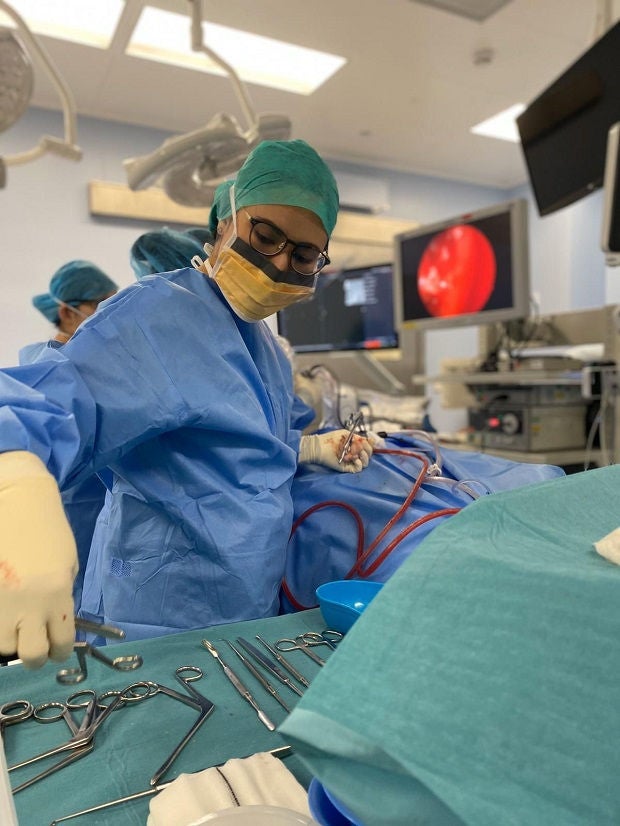
Although hidden from the public eye, the work of Operating Theatre nurses to safeguard the health of every patient is imperative.
The opening of the chest cavity, the fragility of human anatomy, the race against time — these activities of an operating theatre once held the rapt attention of a particular teenager.
“When l was deciding what course of study to pursue in polytechnic, my sister, who is an Operating Theatre (OT) nurse, shared her work experiences with me,” recounted Haryana Binte Zulkifli, Assistant Nurse Clinician, Sengkang General Hospital (SKH). Haryana’s nursing journey has been fuelled by her fascination with the OT and the unseen aspect of patient care.
Working behind the scenes
As an Assistant Nurse Clinician, Haryana specialises in burns, oral and maxillofacial surgery, plastic surgery, and ear, nose and throat surgery. Her role as a perioperative nurse involves providing crucial assistance during surgical operations ensuring the sterility of the environment and surgical instruments and safeguarding the patient’s rights and well-being. As a perioperative nurse, Haryana takes on significant responsibilities. As a patient advocate, she is entrusted with perioperative care of patients undergoing surgery, a role that demands utmost accountability and attention to detail. This includes meticulous planning and coordination to ensure that all instruments, equipment and supplies are available for surgery in a safe environment. Patient safety is always at the forefront as she serves to safeguard patients’ rights during vulnerable moments.
The proficiency of a perioperative nurse extends beyond the mastery of technical roles for complex and multifaceted procedures. With her deep understanding of surgeries and her ability to proactively anticipate the needs of surgeons, her expertise allows her to guide the surgical team to focus on tasks with confidence knowing everything is well organised.
Improving the healthcare experience
Haryana’s dedication to improve the overall patient experience took her nursing journey beyond the OT. In 2019, she received funding from SingHealth Fund Foundation and Ministry of Health to undergo an overseas training programme at Chang Gung Memorial Hospital in Taiwan. Over four weeks, the dedicated nurse made detailed observations of holistic practices she could adopt to implement in SKH.
“As part of pre-training, I took up basic conversational Mandarin classes and learnt more about Taiwanese culture to better understand and communicate with our Taiwanese counterparts,” she said. During the training, she attended meetings with surgical team members to discuss craniofacial surgery. “I also had the opportunity to share my experience and knowledge of Lefort sugery in SKH with the team of Taiwanese nurses, putting up a PowerPoint presentation in Chinese with the help of the senior nurse manager there,” she said, adding that the experience gave her the confidence to push beyond her comfort zone.
Lefort surgery is a form of corrective jaw surgery commonly used to address emergency cases such as fractures, facial deformities, malocclusions and misalignments in the jaw and teeth that can cause chewing or eating problems. While Haryana’s self-initiated guide was intended for new nurses to familiarise themselves with the surgery, it was also conceptualised to apply to patients with obstructive sleep apnoea (OSA). “Previously, Lefort surgery was not used for patients with OSA. Now, we have patients with OSA who are going through the pre-surgical stage and will undergo Lefort surgery in the next one to two years,” she explained.
The guide developed by Haryana continues to help nurses understand the approach by championing best practices and innovation. She ensures patients receive the highest standard of care and that their journey towards recovery is optimised. These contributions showcase her commitment to continuous learning and elevating of the healthcare experience.
“I learned various ways of execution, such as using different instruments and implants at various stages of surgeries, and sourced for similar instrumentation with the multidisciplinary team,” said Haryana. In particular, she was impressed by her overseas counterparts’ expansive scope of work and autonomy in decision-making for patient treatments.
Read more: 5 Golden rules to know when going for an MRI or CT scan.
Recovery from the other side
With 14 years of nursing experience, Haryana appreciates the support of her supervisors and colleagues in helping her to put her best foot forward each day. “Working in an OT can be stressful, but it is rewarding when we have a good team,” she said.
Haryana reserves her time outside of work for her family, including two children and another on the way. An enjoyable day with the family takes the form of a leisurely cycle around Coney Island in the morning and winding down with a movie at night. “Days off are precious for self-care, especially when a surgery can last more than 15 hours!”
Haryana’s journey as a perioperative nurse exemplifies the profound knowledge and skills required for this role in the OT. Her dedication and mastery behind the scenes truly make her one of the unseen heroes in the nursing profession.
Get the latest updates about Singapore Health in your mailbox! Click here to subscribe.













 Get it on Google Play
Get it on Google Play